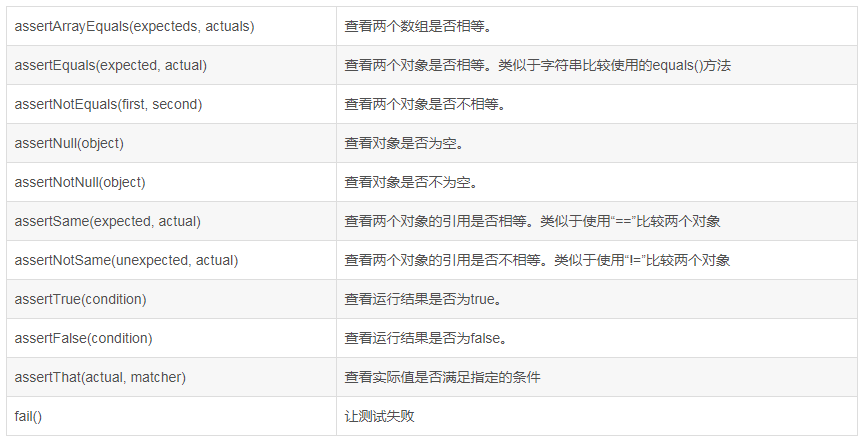junit-断言
断言是编写测试用例的核心实现方式,即期望值是多少,测试的结果是多少,以此来判断测试是否通过。
- 断言核心方法
- 示例
package test;
import static org.hamcrest.CoreMatchers.*;
import static org.junit.Assert.*;
import java.util.Arrays;
import org.hamcrest.core.CombinableMatcher;
import org.junit.Test;
public class AssertTests {
@Test
public void testAssertArrayEquals() {
byte[] expected = "trial".getBytes();
byte[] actual = "trial".getBytes();
org.junit.Assert.assertArrayEquals("failure - byte arrays not same", expected, actual);
}
@Test
public void testAssertEquals() {
org.junit.Assert.assertEquals("failure - strings not same", 5l, 5l);
}
@Test
public void testAssertFalse() {
org.junit.Assert.assertFalse("failure - should be false", false);
}
@Test
public void testAssertNotNull() {
org.junit.Assert.assertNotNull("should not be null", new Object());
}
@Test
public void testAssertNotSame() {
org.junit.Assert.assertNotSame("should not be same Object", new Object(), new Object());
}
@Test
public void testAssertNull() {
org.junit.Assert.assertNull("should be null", null);
}
@Test
public void testAssertSame() {
Integer aNumber = Integer.valueOf(768);
org.junit.Assert.assertSame("should be same", aNumber, aNumber);
}
// JUnit Matchers assertThat
@Test
public void testAssertThatBothContainsString() {
org.junit.Assert.assertThat("albumen", both(containsString("a")).and(containsString("b")));
}
@Test
public void testAssertThathasItemsContainsString() {
org.junit.Assert.assertThat(Arrays.asList("one", "two", "three"), hasItems("one", "three"));
}
@Test
public void testAssertThatEveryItemContainsString() {
org.junit.Assert.assertThat(Arrays.asList(new String[] { "fun", "ban", "net" }), everyItem(containsString("n")));
}
// Core Hamcrest Matchers with assertThat
@Test
public void testAssertThatHamcrestCoreMatchers() {
assertThat("good", allOf(equalTo("good"), startsWith("good")));
assertThat("good", not(allOf(equalTo("bad"), equalTo("good"))));
assertThat("good", anyOf(equalTo("bad"), equalTo("good")));
assertThat(7, not(CombinableMatcher.<Integer> either(equalTo(3)).or(equalTo(4))));
assertThat(new Object(), not(sameInstance(new Object())));
}
}
